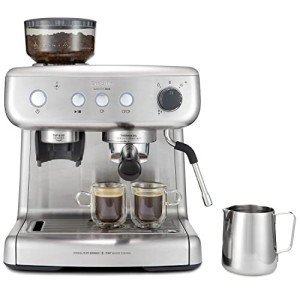Home Use Espresso Machines: A Comprehensive Guide
Espresso machines have ended up being a staple in many homes as coffee enthusiasts look for to replicate café-quality brews in the comfort of their cooking areas. The rise in popularity has caused a diverse market filled with different models, features, and costs. This post aims to supply a helpful summary of home use espresso machines, helping readers browse their options effectively.
Comprehending Espresso Machines
Espresso machines work by requiring warm water through finely-ground coffee under high pressure, resulting in a concentrated coffee drink known as espresso. There are several kinds of espresso machines categorized based upon their developing techniques and level of automation. The most typical types include:
- Manual Espresso Machines: These require the user to manage the pressure and water flow, enabling for a more hands-on coffee-making experience.
- Semi-Automatic Espresso Machines: These use automatic control over water pressure, while the user manually grinds and tamps the coffee.
- Automatic Espresso Machines: With the push of a button, these machines instantly control the flow of water, making it much easier to brew espresso with constant results.
- Super-Automatic Espresso Machines: These all-in-one machines deal with grinding, tampering, brewing, and even milk frothing, making them perfect for users looking for convenience.
- Capsule or Pod Machines: These use pre-packaged coffee pods to create espresso with minimal effort, however they limit option in developing methods and flavors.
Table: Comparison of Espresso Machine Types
| Type | Control Level | Reduce of Use | Cleaning up Level | Ideal For |
|---|---|---|---|---|
| Manual | User-controlled | Moderate | High | Coffee perfectionists |
| Semi-Automatic | Partial automation | Moderate | Moderate | Home baristas |
| Automatic | Fully automated | Easy | Low | Busy people |
| Super-Automatic | Totally automated | Very easy | Really low | Convenience hunters |
| Capsule/Pod | Fully automated | Extremely easy | Very low | Casual drinkers |
Secret Features to Consider
When choosing a home use espresso machine, it's essential to think about various functions that can substantially affect the quality of espresso and user experience.
- Pressure: Look for machines that provide at least 9 bars of pressure, as this is thought about ideal for developing espresso.
- Boiler Systems: Single vs. dual boiler systems figure out temperature stability and the ability to brew espresso and steam milk all at once.
- Grinder: Integrated grinders permit for freshly ground coffee, which enhances flavor. Consider machines with adjustable grind settings.
- Milk Frother: For those who enjoy cappuccinos and lattes, an integrated steam wand or automatic frother is important.
- Size and Design: Consider your kitchen area and visual preferences. Machines are available in different sizes, from compact to large setups.
- Price: Home espresso machines can range from a couple of hundred to numerous thousand dollars, so it's essential to develop a budget before checking out options.
Benefits and drawbacks of Home Use Espresso Machines
| Pros | Cons |
|---|---|
| Convenience of developing coffee in the house | Initial financial investment can be high |
| Quality of espresso is typically superior | Requires some skill, especially with manual machines |
| Ability to experiment with flavors | Maintenance and cleaning can be labor-intensive |
| Can save money in the long run | Not all machines will suit every coffee preference |
Maintenance and Cleaning Tips
Keeping an espresso machine is important for extending its life and making sure constant brew quality. Here are some beneficial tips:
- Regular Descaling: Minerals from water can develop in the machine. Descale every 1-3 months, depending on water hardness.
- Daily Cleaning: Rinse portafilters, baskets, and steam wands after each use to avoid coffee oils from constructing residue.
- Use Filtered Water: This can help in reducing mineral accumulation and improve the taste of coffee.
- Change Gaskets and Seals: These elements might wear out with time and ought to be changed to maintain pressure and efficiency.
- Check out the Manual: Each machine has particular care guidelines; following these will guarantee durability.
Frequently Asked Questions About Home Use Espresso Machines
Q1: What is the best budget espresso machine?The best budget espresso machine often depends on private needs, but designs like the DeLonghi EC155 or the Breville Bambino are popular amongst users for providing fantastic value. Compact Espresso Machines : How long do home espresso machines normally last?With proper maintenance, home espresso machines can last anywhere from 5 to 15 years, depending upon the quality of the machine and frequency of use. Portable Espresso Machines : Can I make coffees and lattes with any espresso machine?While most espresso machines can make coffees and lattes, having a trustworthy
steam wand or frother is important for attaining the right milk texture.
Q4: Are super-automatic machines worth the investment?For Home Espresso Machines who focus on benefit and quick brewing, super-automatic machines can be worth the financial investment, though they may do not have some customizability in brew strength and taste. Q5: What kinds of coffee beans are best for espresso?While individual choice contributes, beans identified as" espresso "blends are generally roasted darker, creating abundant tastes and a creamy texture when brewed.
Investing in a home espresso machine can change the daily coffee regimen into something special, raising home brews to café quality. By understanding the various kinds of machines, key functions to think about, upkeep requirements, and weighing the
benefits and drawbacks, customers can make educated choices that match their private preferences. As the espresso culture continues to grow, no matter the option, every brew can be a tasty experience waiting to be appreciated.

